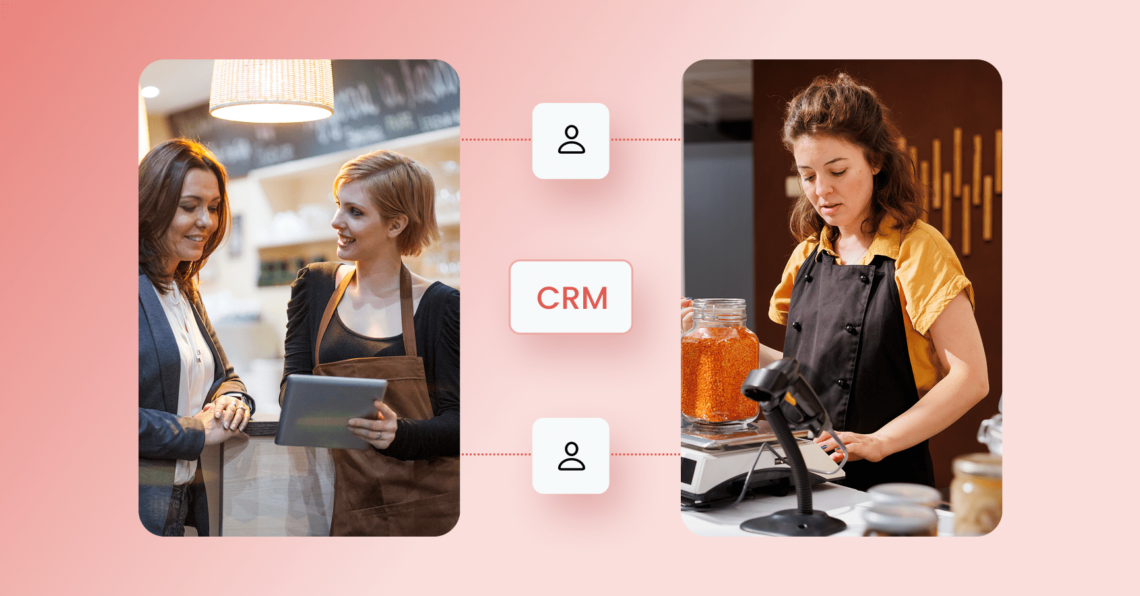The best CRM for small businesses in Australia in 2026 isn’t just about managing contacts, it’s about using AI to drive smarter growth.
Running a small business in Australia in 2026 means doing more with less. With rising operational costs, talent shortages, and tighter consumer spending, achieving growth goals is harder than ever. Sales targets are more ambitious, marketing budgets are shrinking, and building lasting customer relationships requires time and tools that many small teams simply don’t have. That is why choosing the right CRM is essential.
Traditional CRM tools may help you store customer information, but they won’t help you grow your business with it intelligently. AI-powered CRM software, on the other hand, empowers you to automate routine tasks, predict buying behavior, streamline the sales process, and nurture leads — all without impacting the budgets.
Read on to explore what makes an AI customer relationship management (CRM) software different, how it transforms small business operations, and which tools are best suited for your needs in 2026.
Table of contents
- What is an AI CRM solution?
- What is the difference between traditional CRM and AI CRM systems?
- How does an AI CRM work for small Australian businesses?
- Benefits of choosing AI CRM solutions for Australian businesses
- Best AI-powered CRM software for Australian businesses in 2026
- How to choose the best CRM for small business needs:
- Driving adoption for AI CRM in small businesses: Tips and tricks for continued business growth
- Enhance customer relationships with AI CRM platforms for your Australian business
- FAQs on best CRM for small businesses Australia
- Step into a new era of customer relationship management with Birdeye Australia
What is an AI CRM solution?
An AI CRM solution is a modern customer relationship management system that utilizes artificial intelligence to automate tasks, uncover insights, and personalize customer interactions throughout the sales process, from initial contact to deal closure.
Unlike traditional CRM software, which relies heavily on manual input and static workflows, AI-powered CRM software learns from your customer data, detects patterns, and recommends actions that help sales and marketing teams move faster and smarter.
Now, if you’re wondering how this actually plays out in a small business setting, here is a quick example to show how surprisingly intuitive it can be:
Think about all the time your team spends logging calls, assigning leads, remembering follow-ups, or figuring out which deals to prioritize. AI eliminates that guesswork. It scores leads automatically based on behavior, nudges your reps when it's the right time to follow up, and even drafts responses using past conversations. But how about marketing? It can suggest the best times to launch marketing campaigns, segment audiences based on preferences, and optimize messages for better engagement.
In short, an AI CRM system goes beyond contact management but helps you turn data into actionable insights at scale with far less effort.
What is the difference between traditional CRM and AI CRM systems?
Most small businesses in Australia are familiar with traditional CRM software, which stores customer information, manages contacts, and tracks basic activities. But as your business grows and customer expectations evolve, these systems often become clunky, reactive, and labor-intensive. That’s where AI CRM systems come in.
AI CRMs build on the foundation of traditional systems by introducing intelligence. They don’t just record what happened, they anticipate what’s likely to happen next and tell you how to act on it.
Below is a comparison of the two to help you understand the upgrade you’re really making.
| Feature | Traditional CRM | AI CRM |
| Automation | Manual task setup and basic workflow rules | Smart automation for follow-ups, assignments, and scheduling to automate repetitive tasks |
| Sales forecasting | Minimal and relies on static historical data | Real-time predictive analytics based on buyer behavior and past deals |
| Lead qualification | Rule-based lead scoring | AI-driven scoring that adapts over time and prioritizes high-conversion leads |
| Customer interaction management | Basic personalization using tags or templates | Real-time personalization across emails, messages, and calls using AI insights |
| Sales processes optimization | Manual pipelines and static dashboards | Dynamic suggestions to improve sales pipeline flow and shorten the sales cycle |
| Insights and analytics | Basic reporting tools | Contextual alerts, performance breakdowns, and prescriptive actions using advanced analytics |
While traditional CRMs are reactive, AI CRMs are proactive. They guide your sales teams, reduce busywork, and help you make faster decisions that actually move the needle, all without hiring more people.
How does an AI CRM work for small Australian businesses?
An AI-based CRM for small businesses in Australia isn’t just a digital Rolodex for contact management, it’s your silent assistant, strategist, and operations manager rolled into one. It adapts to the realities of running a business with limited staff, evolving customer expectations, and increasing pressure to perform without burning out your team.
Let’s break down what this looks like across four key areas:
- Marketing automation and sales process streamlining
- Targeted marketing campaigns across channels
- Personalized customer service
- Reduction in direct and indirect operational costs
Marketing automation and streamlining sales processes
AI-powered CRM platforms help sales teams reduce manual work and close more deals more quickly. Tasks such as lead assignment, follow-up reminders, and email sequencing are automatically handled, freeing up time for actual sales and customer engagement.
Example: A plumbing business with just two office staff can use AI to instantly assign inbound leads to the right technician, send quotes, and schedule jobs without ever leaving the tool.
Targeted marketing campaigns across channels
With AI-driven CRM systems, you don’t need a large marketing team to build effective campaigns. These tools segment your customer base, track buying behavior, and optimize marketing campaigns based on real-time data.
Example: A boutique skincare brand in Melbourne can identify returning customers, personalize offers based on product preferences, and even sync with AI messaging tools to trigger automated reminders when it's time to reorder.
Personalised customer service
AI CRMs analyze interaction history to recommend the most effective way to respond to inquiries or complaints, thereby improving both the speed and quality of service. They also offer customer support features like chatbots, auto-replies, and self-service portals.
Example: A real estate agency in Brisbane can utilize AI customer service solutions to send tailored property suggestions to prospects based on their browsing history, eliminating the need for manual filtering.
Reduction in direct and indirect operational costs
By automating repetitive tasks, reducing delays, and eliminating the need for multiple disjointed tools, AI CRMs reduce overhead and enable streamlined business processes. They also help you avoid costly mistakes, like missed follow-ups or lost leads.
Example: A café chain utilizing an AI CRM integrates inventory management, tracks loyalty rewards, and automates email outreach without requiring additional staff.
Benefits of choosing AI CRM solutions for Australian businesses
For Australian small businesses, adopting an AI CRM solution helps compete with larger brands, seamlessly expand across multiple locations, and retain existing customers without substantially increasing their investments in customer experience.
Here’s why switching to AI-driven CRM systems outshines even the best CRM software and helps business owners in Australia:
Streamline daily workflows for leaner teams
Most small business owners can’t afford large sales teams or marketing departments. AI CRM systems help bridge that gap. They automate repetitive follow-ups, flag high-intent leads, and suggest the next best actions, allowing teams to focus on building customer relationships rather than chasing administrative tasks.
Compete with larger brands without matching their budget
According to Salesforce, CRM implementation can save up to 27% of customer acquisition costs by shortening sales cycles and boosting customer lifetime value.
Larger competitors are already using AI to personalize outreach, optimize every touchpoint, and outpace smaller players. But AI isn’t just for the big players in town. AI CRM software can also level the playing field by providing small businesses with access to the same predictive insights and automation, without the enterprise price tag.
Improve customer satisfaction without increasing headcount
With AI suggesting timely responses, identifying unhappy customers before they churn, and even resolving issues automatically, your business can deliver high-quality customer support without burning out your team. In sectors such as health, hospitality, and real estate, fast and empathetic service can make or break your reputation.
Make smarter, faster decisions with better data
Traditional CRM systems store customer data, while AI CRMs use that data to tell you what to do next. Whether it’s spotting a dip in sales performance, identifying untapped customer segments, or forecasting demand, AI CRMs help Australian businesses move from guesswork to action.
In short, AI CRM solutions don’t just help you work faster. They help you work smarter, with the insight, speed, and personalization that modern customers expect.
In the next section, we’ll explore 8 AI-powered CRM tools that fit the needs of small businesses in Australia.
Best AI-powered CRM software for Australian businesses in 2026
Not every CRM software is designed with small businesses in mind, and even fewer combine intuitive design with powerful AI capabilities. Here are eight of the best CRM tools for small business needs in Australia, based on their AI functionality, local suitability, and user feedback.
Hubspot
HubSpot offers a freemium CRM system that’s ideal for small business owners looking to scale gradually. Its AI features help automate email follow-ups, predict sales pipeline outcomes, and personalize customer communications. This system is particularly suitable for service-based businesses and agencies seeking a plug-and-play CRM solution with robust automation capabilities.
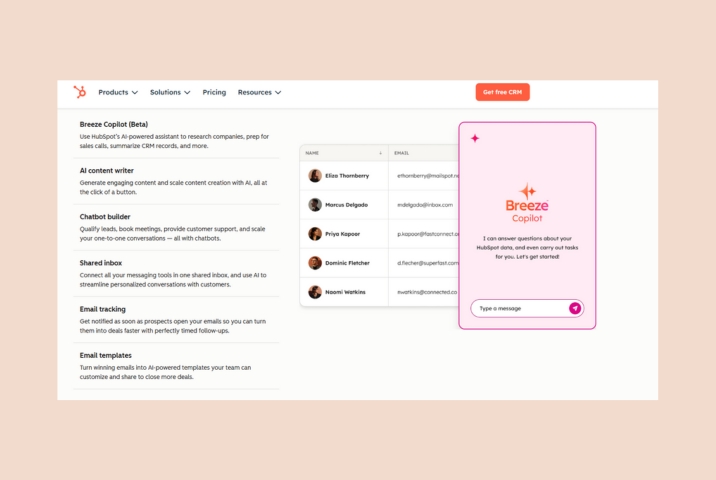
Key features:
- Predictive lead scoring
- AI content assistant for emails and sales sequences
- Smart send-time optimization
- Chatbot builder for customer support
Pros:
- Free tier with rich CRM features
- Strong ecosystem of sales, service, and marketing automation tools
- Easy to use with a minimal learning curve
Cons:
- Paid plans can get expensive as your contact list grows
- Customization is limited unless you’re on higher-tier plans
Zoho
Zoho CRM is an affordable, highly customizable CRM system suitable for small to medium-sized businesses. Its AI assistant “Zia” provides predictive lead scoring, smart alerts, and analytical insights tailored to your customer base.
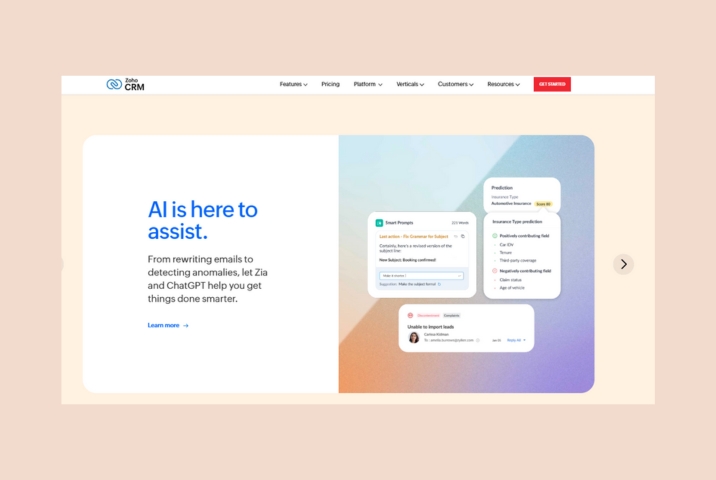
Key features:
- AI assistant “Zia” for lead scoring and anomaly alerts
- Workflow automation for task and lead management
- Custom dashboards with real-time analytics tools
Pros:
- Deep customization modules, fields, layouts, and workflows
- Powerful process automation saves time on routine tasks
- Seamless integration with the wider Zoho ecosystem and popular third-party tools
Cons:
- The interface can feel outdated and unintuitive, especially for new users
- Mobile app lacks polish and may perform inconsistently
- Customer support is slow or inconsistent on lower-tier plans
Salesforce
Salesforce Sales Cloud is a CRM system that offers deep customization and robust AI features, including Einstein Analytics. It suits both small businesses and larger Australian enterprises, enabling them to scale with advanced workflows and integrations.
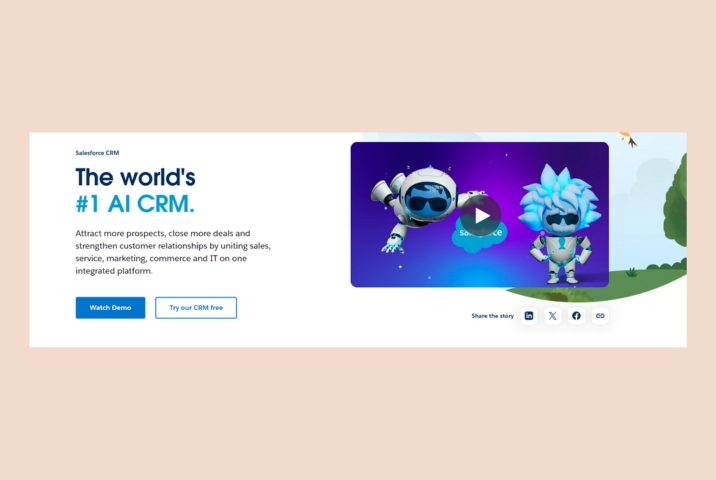
Key features:
- Einstein AI delivers predictive analytics and sales forecasting
- Automated workflows and next-step recommendations help streamline sales operations
- Intelligent lead management with scoring and anomaly alerts
Pros:
- Centralizes customer interactions, activities, and case tracking in one platform
- Extensive automation tools (workflows, triggers, AI) reduce manual workload
- Scalable ecosystem integrates easily with marketing, service clouds, and external tools
Cons:
- Steep learning curve and overwhelming for smaller teams
- High cost, even at entry-level, a common challenge for small businesses
- Interface performance can degrade with complexity or large datasets
Monday
Monday.com is a versatile CRM system built on its Work OS, which combines sales pipeline management and project management functionalities. It’s known for its visual custom boards, no-code automations, and an AI assistant that enhances productivity for small businesses and growing Australian teams
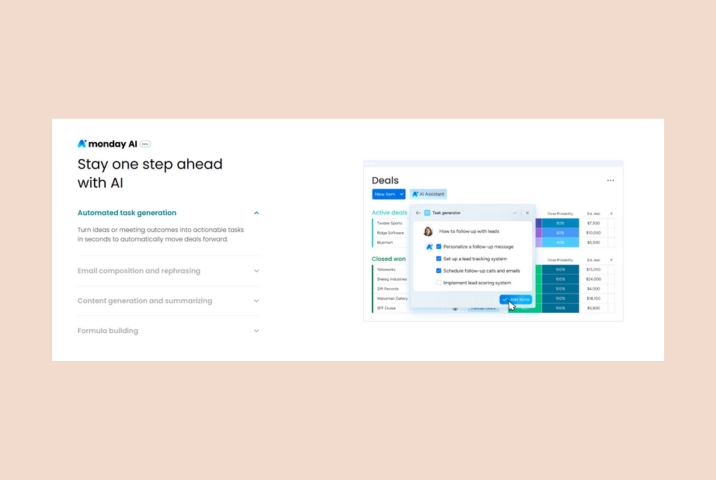
Key features:
- Built-in AI email generator and sentiment analysis
- AI-powered forecasting to guide sales teams
- AI agent for customer tickets and auto-routing support tasks
- No-code automations streamline repetitive workflows
Pros:
- Intuitive and visual interface makes it accessible:
- Highly customizable workflows and dashboards adapt to unique business models
- Strong integration ecosystem—500+ apps including Slack, Google, and Zapier
Cons:
- Steep learning curve for advanced setups
- Limitations in free/basic plans, especially around automation caps and advanced features
- Mobile app lags and some workflow features feel incomplete on mobile
FreshSales
Freshsales is an AI-enhanced CRM system well‑suited for small to medium-sized businesses in Australia. It offers intuitive pipeline management, lead scoring, and Freddy AI insights at a price point that’s more affordable for tight budgets.
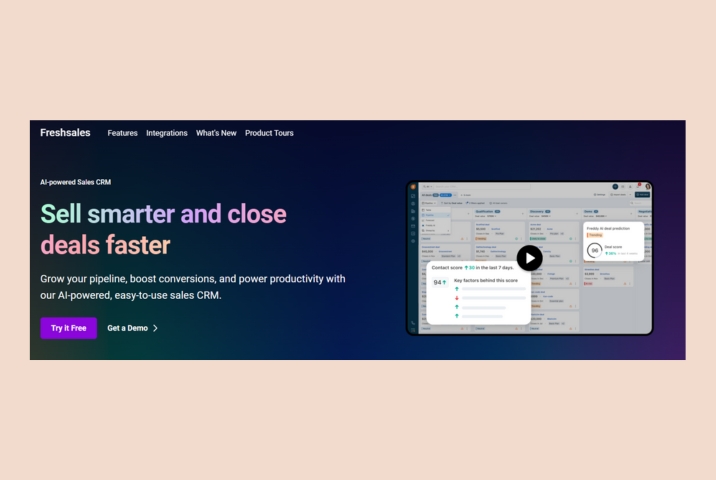
Key features:
- Freddy AI powers lead scoring, email suggestions, and predictive insights
- Automated workflows for lead management and sales pipeline actions
- Multichannel communication tracking and built-in analytics
Pros:
- Users consistently praise its ease of use and intuitive interface
- Affordable pricing compared to enterprise-grade CRM software
- Responsive customer support, especially for small teams
Cons:
- Lacks certain advanced features; some workflows feel incomplete
- Reporting and dashboard tools can be confusing or limited
- Some users report slower or less reliable mobile experiences
ClickUp
ClickUp is an all‑in‑one CRM platform built on its project-focused Work OS, combining sales pipeline views, project management, task collaboration, and powerful AI capabilities ideal for small businesses in Australia.
Key features:
- ClickUp Brain/AI Agents automate tasks, generate emails, summarize meetings, and suggest next steps
- Voice‑to‑text and smart automations centralize workflows
Pros:
- Advanced reasoning models and multiple AI models
- Extremely customizable views (List, Board, Gantt, Calendar) empower project management, plus sales tracking
Cons:
- Performance issues on older PCs when running many automations
- The initial learning curve can be steep for new users
Pipedrive
Pipedrive is a user-friendly CRM software focused on sales operations with clear visuals, automation, and integrated AI to streamline pipelines and closing deals.
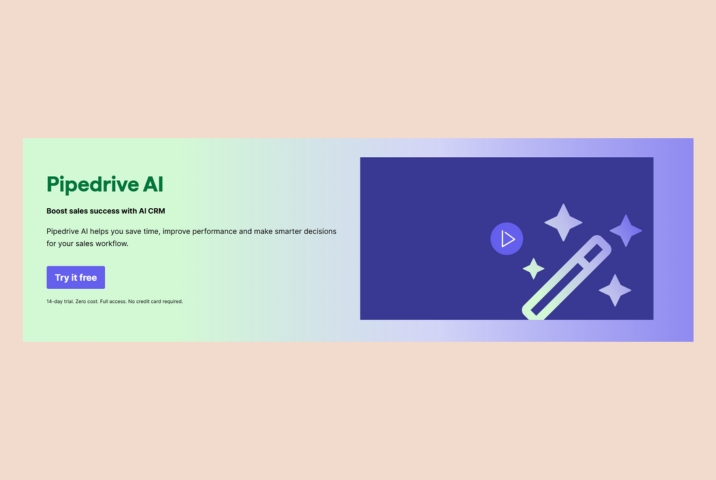
Key features:
- AI-powered lead scoring and opportunity insights
- Automated workflows and email tracking to enhance sales pipeline efficiency
Pros:
- Customizable sales pipelines, real‑time insights, and powerful AI features
- Excellent lead management (85%) and email integrations, with a broad third‑party ecosystem
Cons:
- Lacks a free tier, making it less accessible for micro‑businesses
- Advanced reporting may require paid add‑ons or higher-tier plans
Zendesk
Zendesk combines ticketing, live chat, social messaging, and phone into a single CRM platform designed to elevate your customer support. Its AI-powered workflows and automations help sales teams and service teams scale support efficiently while maintaining personalized interactions.
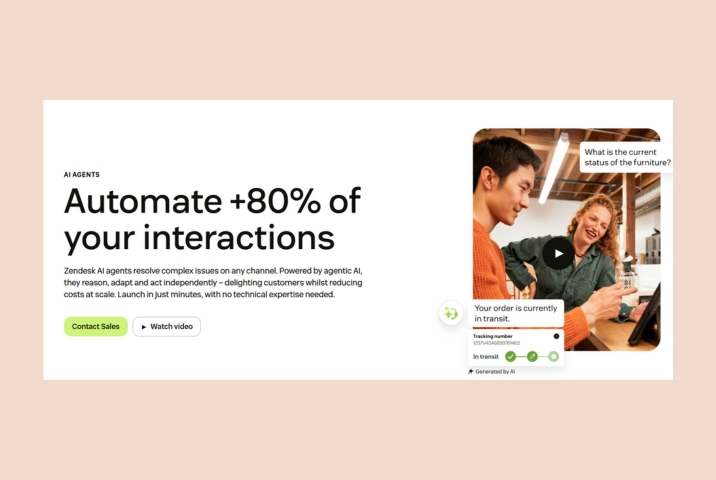
Key features:
- AI-driven workflows automatically route and escalate tickets
- Generative AI bots resolve common questions around the clock
- Agent Workspace gives context-rich AI suggestions during interactions
Pros:
- Ease of use and fast setup, even for non‑technical staff
- Robust omnichannel tools that centralize customer interactions across email, chat, social, and voice
- Automation via triggers, macros, and a full app Marketplace enables scaling without extra hires
Cons:
- Steep learning curve when configuring more complex workflows
- Advanced AI features are often limited to higher-tier plans, increasing cost for small businesses
- Some ticketing nuances like timestamp delays or missing ticket duplication options can frustrate teams
Supercharge customer experience with AI CRM systems and Birdeye
Want to see the impact of Birdeye on your business? Watch the Free Demo Now.
As you’ve seen, each of the CRM platforms above offers unique strengths. Whether you’re looking for affordable CRM software like Zoho CRM, a more intuitive project management hybrid like Monday.com or ClickUp, or a powerhouse platform like Salesforce, the right fit depends on your specific business needs, budget, and tech capabilities.
But across the board, one thing is clear: AI is no longer a luxury. It's a necessity for small businesses in Australia competing for time, talent, and customer attention. The right AI CRM system doesn't just improve how you track your pipeline, it transforms how you build and maintain customer relationships, manage workflows, and grow your business sustainably.
How to choose the best CRM for small business needs:
Selecting the best CRM software for small businesses in Australia involves finding one that aligns with your goals, team size, and customer expectations. In this section, we’ll break down the key features and evaluation criteria that matter most when selecting an AI-powered CRM system for your business.
Manage customer data and contact records effortlessly
Your CRM system should centralize all customer information (emails, calls, preferences, purchase history) and make it easily accessible to your team. Look for AI tools that help clean and organize CRM data, reducing manual entry and eliminating duplicates, especially if you’re migrating from spreadsheets or outdated systems.
Track leads and monitor the full sales pipeline
AI CRMs must simplify lead management by scoring leads based on behavior, engagement, and past conversions. Choose a platform with a clear, visual sales pipeline to help your sales team identify bottlenecks, prioritize outreach, and accelerate the sales cycle.
Use predictive sales forecasting and AI analytics
The best CRM solutions offer built-in analytics tools to project sales trends and performance. Look for AI-driven dashboards that surface insights in real-time, helping you shift strategy without waiting for end-of-month reports.
Automate marketing and sales tasks
A solid AI CRM will help automate repetitive tasks like email sequences, meeting scheduling, or follow-up reminders. Bonus points if it integrates with your existing marketing automation tools to streamline customer outreach and campaign workflows.
Enable mobile CRM access and cloud flexibility
Your team needs flexibility. A good mobile CRM lets users update deals, view customer history, and access task lists on the go, whether they’re on a job site, in a clinic, or running between showings.
Ensure CRM localization and Australian data compliance
Australian businesses must comply with data laws, such as the Australian Privacy Principles (APPs). Ensure your CRM vendor supports data management and aligns with local compliance requirements, particularly when handling personal or health-related customer data.
Integrate seamlessly with other business tools
Your CRM doesn’t work in isolation. The best CRM solutions connect with your accounting software, scheduling tools, email platforms, local SEO, and messaging apps. This eliminates manual syncs and reduces friction across your business operations.
“Before Birdeye, reputation management was a fragmented, time-intensive process that relied on manual tracking and reactive workflows. With Birdeye, we’ve automated/streamlined 80% of our review monitoring, response workflows, and customer feedback collection. Their seamless integration with our CRM and communication tools greatly reduced manual workload, freeing our team to focus on more impactful strategic initiatives. Real-time alerts and centralized dashboards turned hours of daily busywork into minutes.”
Xavier Wilson, Online reputation Supervisor
Guarantee data privacy and robust security standards
Security is a deal-breaker. Inquire whether your CRM provides two-factor authentication, audit trails, role-based access, and encryption. AI introduces additional complexity, so ensure the system is transparent about how data is used for predictions and automation.
Support business scalability and future growth
Even if you’re starting small, choose a CRM provider that can grow with you. Look for platforms that offer advanced AI features, scalable plans, and industry‑specific modules, especially if you expect to expand locations or services in the next 12–24 months.
Driving adoption for AI CRM in small businesses: Tips and tricks for continued business growth
Rolling out a new AI CRM system is only effective if your team actually uses it. Here are practical ways small businesses in Australia can encourage adoption and maximize long-term value:
- Define clear goals from the start: Align CRM setup with specific outcomes, like improving sales performance, response time, or customer satisfaction.
- Train in small, manageable steps: Start with core functions (e.g., lead management, contact records) and gradually introduce advanced features.
- Appoint CRM champions: Identify team members to lead the rollout, assist others, and streamline implementation.
- Track usage and request feedback: Use CRM reporting tools to monitor engagement and refine workflows based on genuine user input.
- Integrate with your existing tools: Connect with platforms like accounting software, calendars, or email for smoother day-to-day operations.
- Celebrate small wins early: Share examples where AI helped close deals faster or automate repetitive tasks, this builds trust and momentum.
- Position the CRM as a business essential: Make it clear the CRM isn’t optional, it’s central to managing customer relationships, marketing, and operations.
Enhance customer relationships with AI CRM platforms for your Australian business
In today’s competitive market, building loyal customer relationships requires more than spreadsheets and manual follow-ups. AI-powered CRM solutions enable small businesses in Australia to personalize at scale, respond more quickly, and make informed decisions based on real-time data. Whether it’s automating outreach, predicting churn, or helping your sales team prioritize high-converting leads, the right CRM software becomes your growth engine.
If your current system only stores customer data, it’s time to upgrade. AI CRM platforms help you move from managing information to deepening engagement. And when chosen wisely, they don’t just enhance processes, they transform how you build trust and long-term value with every customer.
FAQs on best CRM for small businesses Australia
AI helps sales reps save time and close more deals by automating follow-ups, scoring leads based on intent, and suggesting the next best actions. It prioritizes the hottest leads, auto-generates personalized emails, and flags deals at risk. This allows reps to focus on building relationships, rather than administrative work.
Bias in AI can skew lead scoring, targeting, or customer segmentation if the training data is unbalanced or incomplete, resulting in poor decision-making, missed opportunities, or unfair treatment of certain customer groups. Regular monitoring and diverse data inputs are crucial for avoiding these issues.
Yes, many agentic AI solutions can be layered onto existing CRM platforms through APIs or native integrations. They automate workflows, assist with messaging, and enhance decision-making without replacing your entire system. However, integration success depends on your CRM’s flexibility and data infrastructure.
Absolutely. Most modern CRM solutions now incorporate AI features, including predictive analytics, automation, and real-time insights. Combining CRM and AI enhances efficiency, customer engagement, and helps small teams punch above their weight.
Step into a new era of customer relationship management with Birdeye Australia
If you’re ready to go beyond basic CRM software and truly transform how your business connects with customers, it’s time to explore Birdeye.
Birdeye is the #1 AI platform for local and small businesses in Australia, helping you unify reviews, listings, and messaging under one smart system. With AI built for real-time automation, customer insights, and omnichannel engagement, Birdeye helps you attract, convert, and retain more customers with fewer resources.
Discover how Birdeye AI tools can help your small business:
- Listings AI: Keep all your business information up to date, everywhere
- Reviews AI: Automatically generate, monitor, and respond to reviews
- Social AI: Schedule, optimize, and publish content across platforms
- Insights AI: Analyze sentiment and surface trends from every interaction
- Chatbot AI: Automate responses, lead capture, and appointment bookings
Ready to grow smarter? Explore Birdeye’s CRM solutions for Australia

Originally published
